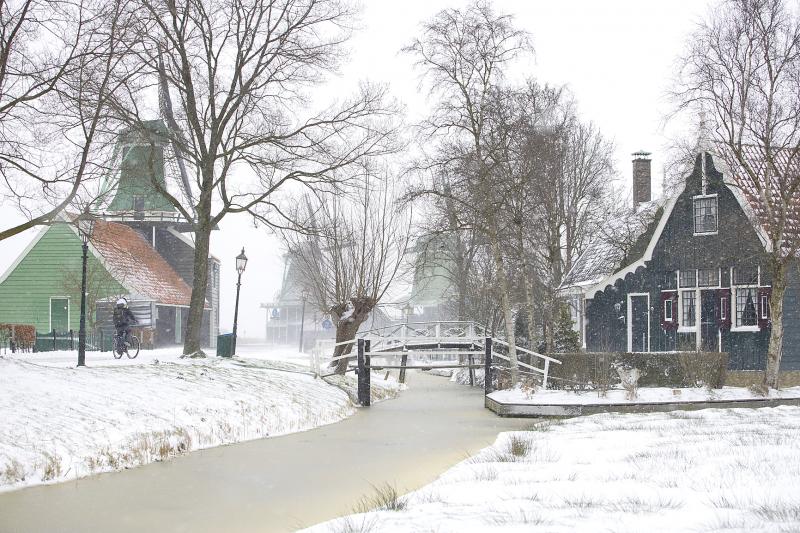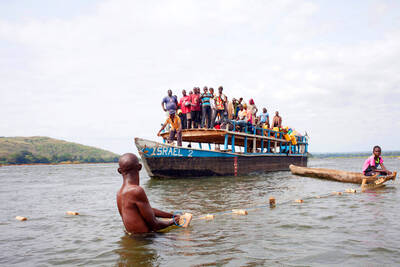The Netherlands and parts of Germany were on Sunday blanketed by a snowstorm that disrupted planes and trains and put some COVID-19 testing on hold.
The UK was also bracing for heavy snow from what Dutch meteorologists have called Storm Darcy, which was packing winds of up to 90kph.
People rushed outdoors to enjoy sledging and playing in the snow in Dutch and German cities, despite the bitterly cold conditions, with temperatures as low as minus-5°C.

Photo: AP
However, Dutch authorities declared a rare “code red” emergency for the entire country as it was hit by its first proper snowstorm in more than a decade.
Weather forecasting Web site Weer.nl said that gusts of wind reaching eight on the Beaufort scale were measured overnight in combination with snowfall, adding: “This officially means a snowstorm in our country.”
“It is the first snowstorm in a long time: The last snowstorm took place in January 2010,” it said.
Dozens of flights were delayed or canceled at Amsterdam’s Schiphol Airport, while Eindhoven Airport in the south of the country scrapped all services.
All trains were canceled in the Netherlands, including international services to Germany. Trams were halted in Amsterdam, while a tram derailed in the snow in The Hague, an Agence France-Presse reporter saw.
Motorists were advised to avoid traveling and more than 80 vehicles were reported to have skidded off the road.
Most parts of the country had 5cm to 10cm of snow, but some areas received 30cm, public broadcaster NOS said.
The conditions were so severe that the Dutch government had closed all coronavirus testing centers for several days.
Up to 10 days of sub-zero daytime temperatures are expected in the Netherlands, raising hopes in the skating-obsessed country that canals would freeze over.
Dutch Prime Minister Mark Rutte has said ice skating would be allowed if the canals freeze for the first time since 2018, but warned people to observe social distancing and to try not to fall over and end up in already overstretched hospitals.
In Germany, snowfall caused major disruption to trains and cancelations of services between cities including Hamburg and Hanover.
Thick snow of up to 30cm disrupted road traffic, with hundreds of accidents and part of a motorway in North Rhine-Westphalia closed by police after it turned into an ice rink.
Several vehicles were trapped beneath piles of snow and their owners had to dig them out with shovels, according to pictures on the Bild Web site.
Heavier snow of up to 40cm was expected in parts of northern Germany overnight, meteorological service DWD said.
Belgium received a light dusting of snow, but was expecting a big temperature drop as the week progresses.
In the UK, the Meteorological Office issued an amber weather warning in southeast England for what local media dubbed the “Beast from the East II.”
The first “beast” in 2018 dumped 10 days of snow in the UK.
The current warning is for roads becoming blocked by deep snow and disruptions to bus, rail and air travel.

‘IN A DIFFERENT PLACE’: The envoy first visited Shanghai, where he attended a Chinese basketball playoff match, and is to meet top officials in Beijing tomorrow US Secretary of State Antony Blinken yesterday arrived in China on his second visit in a year as the US ramps up pressure on its rival over its support for Russia while also seeking to manage tensions with Beijing. The US diplomat tomorrow is to meet China’s top brass in Beijing, where he is also expected to plead for restraint as Taiwan inaugurates president-elect William Lai (賴清德), and to raise US concerns on Chinese trade practices. However, Blinken is also seeking to stabilize ties, with tensions between the world’s two largest economies easing since his previous visit in June last year. At the

UNSETTLING IMAGES: The scene took place in front of TV crews covering the Trump trial, with a CNN anchor calling it an ‘emotional and unbelievably disturbing moment’ A man who doused himself in an accelerant and set himself on fire outside the courthouse where former US president Donald Trump is on trial has died, police said yesterday. The New York City Police Department (NYPD) said the man was declared dead by staff at an area hospital. The man was in Collect Pond Park at about 1:30pm on Friday when he took out pamphlets espousing conspiracy theories, tossed them around, then doused himself in an accelerant and set himself on fire, officials and witnesses said. A large number of police officers were nearby when it happened. Some officers and bystanders rushed

Beijing is continuing to commit genocide and crimes against humanity against Uyghurs and other Muslim minorities in its western Xinjiang province, U.S. Secretary of State Antony Blinken said in a report published on Monday, ahead of his planned visit to China this week. The State Department’s annual human rights report, which documents abuses recorded all over the world during the previous calendar year, repeated language from previous years on the treatment of Muslims in Xinjiang, but the publication raises the issue ahead of delicate talks, including on the war in Ukraine and global trade, between the top U.S. diplomat and Chinese

RIVER TRAGEDY: Local fishers and residents helped rescue people after the vessel capsized, while motorbike taxis evacuated some of the injured At least 58 people going to a funeral died after their overloaded river boat capsized in the Central African Republic’s (CAR) capital, Bangui, the head of civil protection said on Saturday. “We were able to extract 58 lifeless bodies,” Thomas Djimasse told Radio Guira. “We don’t know the total number of people who are underwater. According to witnesses and videos on social media, the wooden boat was carrying more than 300 people — some standing and others perched on wooden structures — when it sank on the Mpoko River on Friday. The vessel was heading to the funeral of a village chief in